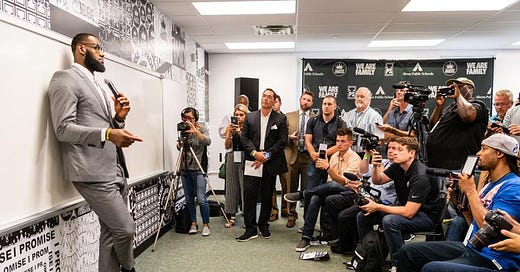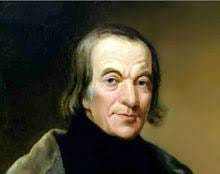LeBron James Reinvents Utopian Socialism
Last month Justin Tinsley wrote a piece about the I Promise School, the Akron public school that LeBron James opened with his LeBron James Family Foundation back in 2018. Specifically the piece is about all the other wraparound services the Foundation and the school have opened since then, to support the students and their families. Reading all this naturally made me think about Robert Owen.
Owen, along with guys like Charles Fourier and Henri de Saint-Simon, was one of the key “utopian socialists” — a strain of pre-Marxian socialism that envisioned ways of reconfiguring society to lessen the ills of industrial capitalism. Their various plans ran the gamut to include lots of personal idiosyncrasies, but one thing that united them was the idea that these better societies could be built within capitalism, instead of after some hypothetical socialist revolution. They envisioned and — since many of them, including Owen, were quite wealthy — were able to actually build small, planned communities where they could put their ideas into practice.
In other words, Owen, like LeBron, was a rich guy who had a lot of ideas about how he could fix things for the poor, plus enough money to implement those ideas. And also like LeBron, most of Owen’s ideas centered on education. Here is an early excerpt from Owen’s most famous collection of essays, called A New View of Society:
“...the governing powers of all countries should establish rational plans for the education and general formation of the characters of their subjects. These plans must be devised to train children from their earliest infancy in good habits of every description (which will of course prevent them from acquiring those of falsehood and deception). They must afterwards be rationally educated, and their labour be usefully directed. Such habits and education will impress them with an active and ardent desire to promote the happiness of every individual, and that without the shadow of exceptions for sect, or party, or country, or climate.”
Compare this to what LeBron James said in 2018, when his school first opened:
“This age, I believe, is a turning point for either going one way or the other. I didn’t know what was next for me, but the guidance I got after that moment from family and little league coaches is the reason why I’m here today…I think schools build structure…and kind of sets you up for life after, when you become an adult. You have that structure, that stability, something to fall back on…I think the support system is more important than anything.”
It might be easy to tune this stuff out as the kind of bland clichés about the importance of education, which nobody would dispute. But I think it’s worth paying attention to this precisely because this way of thinking, which was so radical when Owen was writing in 1813, is so dominant now.
For example, note that neither Owen nor LeBron are emphasizing education for its content — they’re not saying we need more kids learning to code. They both think that education is the answer to poverty because it provides what Owen calls “good habits” and “character,” and what LeBron calls “structure” and “stability.” In other words, education is not just important for what you learn, but for the kind of person it turns you into, i.e. someone with “good habits” and “structure.”
So far this is still pretty uncontroversial. Some education reformers do emphasize content more (those annoying STEM advocates, for example), but nobody would really quibble with the idea that education is important in forming character. The problem here is that when you pair the observation that education forms character, with the hope that education can alleviate poverty, you can end up concluding that the poor are poor because of some deficiency in their character. They are poor because they lack “good habits” and “structure,” and if we just teach that to them, we can solve their problems.
Owen was quite explicit about this. He really thought you could teach people not to be poor:
“On the experience of a life devoted to the subject, I hesitate not to say, that the members of any community may by degrees be trained to live without idleness, without poverty, without crime, and without punishment; for each of these is the effect of error in the various systems prevalent throughout the world. They are all necessary consequences of ignorance.”
LeBron James is not so blatantly paternalistic about it, but nevertheless he seems to be building himself a company town in Akron. The latest story about his I Promise School is about all the social services being built alongside it. This is a natural next step for those who believe that education can fix poverty by building the right values and character in students. After all, school is not the only thing that shapes your values, and the ability of schools to get through to students is shaped by all the other challenges students face.
In other words, if you want to teach kids properly, you can’t just reform education — you also have to address housing and health care and transportation and the justice system and basically every other aspect of life. Indeed, the LeBron James Family Foundation seems to be realizing this. From Tinsley’s story:
“When the I Promise School opened, students were offered free uniforms, free bicycles and helmets, free transportation up to two miles, and free breakfast, lunch and snacks. Now, the Family Resource Center offers students and their families medical care (including eye care), mental health support, financial literacy programming, and a full-time food pantry with everything from fresh produce to hygiene products.”
The school is also opening transitional housing for students’ families, as well as a primary care medical center.
It is in this way that LeBron’s experiment goes beyond just normal education reform stuff and starts to really look like utopian socialism. Because what made utopian socialism a full-throated philosophy, as opposed to just a bunch of guys with ideas about education, was its belief in the “utopia” part — the idea that large, intentional communities could be set up to put these ideas into practice. Owen himself (along with his wealthy father-in-law) bought a mill in New Lanark, Scotland, and proceeded to put his ideas about education into practice. And since his ambitions for “education” were not limited to classroom learning, he did the same thing LeBron is trying to do now: He tried setting up new systems of housing, of criminal justice, of public safety, of physical health and exercise, etc. Other utopian socialists, like Charles Fourier and Étienne Cabet tried similar experiments.
Some of these experiments were quite successful for a limited time, but none of them really lasted, or grew to any significant size. The problem is that most of these communities were dependent on the perpetual support of one — often overbearing and idiosyncratic — leader, which made them hard to replicate or sustain.
Another way of saying this is that utopian socialism neglected the importance of class struggle, and class consciousness, in building a better society. Indeed, these ideas are noticeably absent from the work of these thinkers, who all seemed to believe that if you could demonstrate how good your ideas were in a trial run, then society at large would just accept them. There’s no sense that there is a class of people who benefit from things being bad for the poor. Indeed, the term “utopian socialism” was bestowed on these thinkers by later socialists, who thought it was a tad naïve to imagine socialism originating out of the benevolence of rich people.
Which brings us back to LeBron James, the latest rich guy who’s going to save the poor. I don’t mean to be overly cynical about his project. There’s a lot to like about the I Promise School: Unlike other education reform proposals pushed by the rich, it’s not tied to the union-busting charter school movement, and it is refreshing to see people recognize the role of social support in school success. But even granting this project the most generous interpretation, it’s hard not to see it suffering from the same pitfalls as the utopian socialist communities, because it is not really committed to class liberation.
In his discussions of the school, LeBron emphasizes his belief in its ability to lift people out of poverty. But it’s always as individuals, and never as a class.
He highlights the ability of the school to create “The next Barack/Michelle Obama, the next Jay Z, the next Serena Williams,” but what about the students who don’t become rich and famous?
LeBron James is obviously not a socialist, but there’s a strain of utopian socialism in much of modern liberalism. While thinkers like Owen and Fourier did espouse certain socialist principles, like the labor theory of value and capitalist modes of appropriation, what really unites them is a belief that the problems of poverty could be solved with the right application of ideas. That the poor were not confined to their lot by God or nature or genetics or fate, but by certain institutions of industrial capitalism — institutions that could be reformed.
These ideas have mostly been absorbed by liberal democratic values now. The idea that poverty is fixable is an idea shared across almost all the political spectrum. The only question is how to do it. Is it by addressing pathologies specific to the poor, or is it by implementing the brilliant ideas of great (rich) men like LeBron James? Or is it, perhaps, by the liberation of the working class? Which solution do you have faith in?




